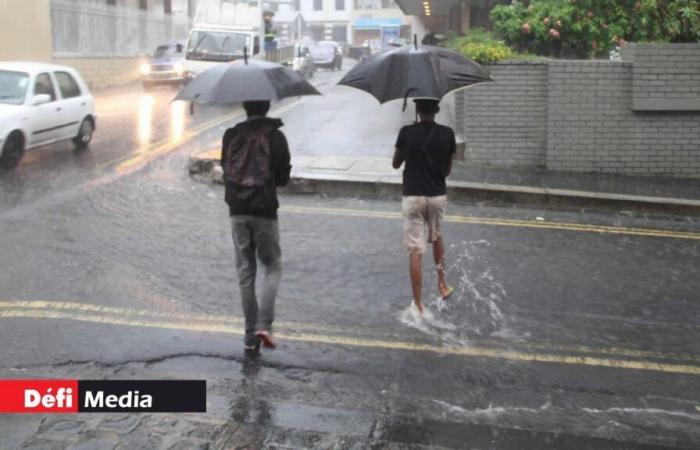In Mauritius, an unequal weather protocol protects civil servants, but exposes private employees to the late decisions of employers. Unions require a unified law to guarantee everyone’s safety in the event of bad weather.
In Mauritius, each notice of torrential rains or cyclone revives a glaring injustice: Workers in the public sector benefit from a clear protocol dispensing them to go to work, while those in the private sector remain at the mercy of often late and discretionary decisions of their employers, influenced by the non -binding recommendations of Business Mauritius. Faced with this disparity, unionists Radhakrishna Sadien and Haniff Peerun call for urgent legislative reform to establish a unified protocol, applicable to all sectors, in order to guarantee equity and security in the event of extreme weather conditions.
Radhakrishna Sadien, president of the State and Other Employees Federation, is indignant at the existence of two categories of workers in Mauritius. “When a torrential rainy opinion is issued, the government acts quickly: schools close, public institutions suspend their activities, and civil servants, except those of essential services, are authorized to stay at home. It is a responsible measure, which protects families and avoids risks on often flooded roads. But what about private sector employees? He questions.
Too often, these workers must wait until their employers, guided by Business Mauritius, decide if they can go home or must stay at their workplace. This expectation, sometimes until the weather conditions worsen, exposes employees to unnecessary dangers. Radhakrishna Sadien illustrates this problem by a tragic example: during a recent cyclone, a bus recipient lost his life by taking his motorcycle to go to work, immediately after the lifting of the cyclonic alert. “How many dramas will it still take for the government to legislate?” He protests.
He denounces the absence of a binding framework forcing the private sector to follow the same directives as the public. “Private workers, some of whom leave their home from 5 am, should not depend on the goodwill of a employers’ federation for their safety. When the government decrees a state of meteorological emergency, this decision must apply to everyone, without exception, ”he insists.
The trade unionist also dwells on the immense pressure exerted on private sector employees, in particular those with family responsibilities. “Imagine the panic of a parent with young children, whose school is closed due to torrential rains, but who must still go to work because his employer has not yet made a decision. This uncertainty is intolerable, ”he explains.
He criticizes the culture of profit which, according to him, dominates the priorities of certain employers, believing that it is time that social responsibility takes precedence over the shortfall of a day. For Radhakrishna Sadien, the solution is clear: a law must be adopted to force the private sector to align its practices with those of the public: “A unified protocol, registered in the legislation, would end this dependence on an informal verbal agreement with Business Mauritius. In the event of a alert of torrential rains or cyclone, workers’ safety must be absolute priority, not a decision left at the discretion of employers. »»
An absence of a restrictive legal framework
Haniff Peerun, president of Mauritius Labor Congress, shares the indignation of Radhakrisna Sadien and points to the weakness of current arrangements. “What is the weight of a verbal agreement in the face of an official regulation, published in the Gazette and having the force of law? He questions. According to him, the absence of a binding legal framework allows employers to favor its economic interests to the detriment of the human aspect. “Employers too often forget that their profits are based on the work of their employees. In the event of bad weather, they should be the first to guarantee their security, not the last to react, ”he underlines.
This disparity, he continues, is not limited to the management of bad weather. “For the same job, wages in the private sector are often lower than those of the public, and less protected working conditions. This inequality is exacerbated during periods of crisis, such as torrential rains. The essential services, whether public or private, benefit from clear security protocols. Why are other private workers left behind? He lambasted.
He also recalls the public financial support granted to the private sector for difficult periods, such as the COVVI-19 crisis. “The government has injected public funds to save businesses, but these same companies do not show recognition towards their employees in terms of security. Business decisions Mauritius often arrive too late, when workers are already at their workplace, exposed to risks. Why not act simultaneously with the government, as soon as a meteorological opinion show? He asks.
The two trade unionists converge on a requirement: the end of informal arrangements and the establishment of a unified protocol. Article 32 of the Workers’ rights Act already stipulates that employers cannot force their employees to work in the event of an official emergency directive. But this provision, according to them, is insufficient, because it does not impose an automatic closure of non -essential activities in the private sector, unlike the public. A specific law, with clear criteria would end arbitrary decisions and guarantee that all workers, public or private, be protected in the same way.
Workers’ Rights Act: Protection of workers in bad weather
Article 32 of the World Rights Act 2019 plays a key role in the protection of the rights of Mauritian workers in the event of extreme weather conditions. This provision, reinforced by the recent amendments brought by finance Act 2024, clearly establishes the obligations of employers and the rights of employees when the weather jeopardizes security in the workplace.
Depending on this article, when a class III or IV cyclonic warning is issued by the authorities, or an alert is launched due to torrential rains or any other dangerous weather situation, workers are not required to go to their workplace. If these conditions arise when they are already at work, the employer must take the necessary measures so that they can go home safely.
The most important thing: the days when workers cannot go to work because of these bad weather should not be deducted from their leave. In addition, article 32 provides that the workers concerned must be remunerated normally, without penalty or loss of salary, provided that the absence is justified by the extreme weather conditions officially recognized.
This measure aims to guarantee both the physical security and the financial stability of employees, while imposing on employers a responsibility for common sense and solidarity in the face of increasingly frequent climatic vagaries.








